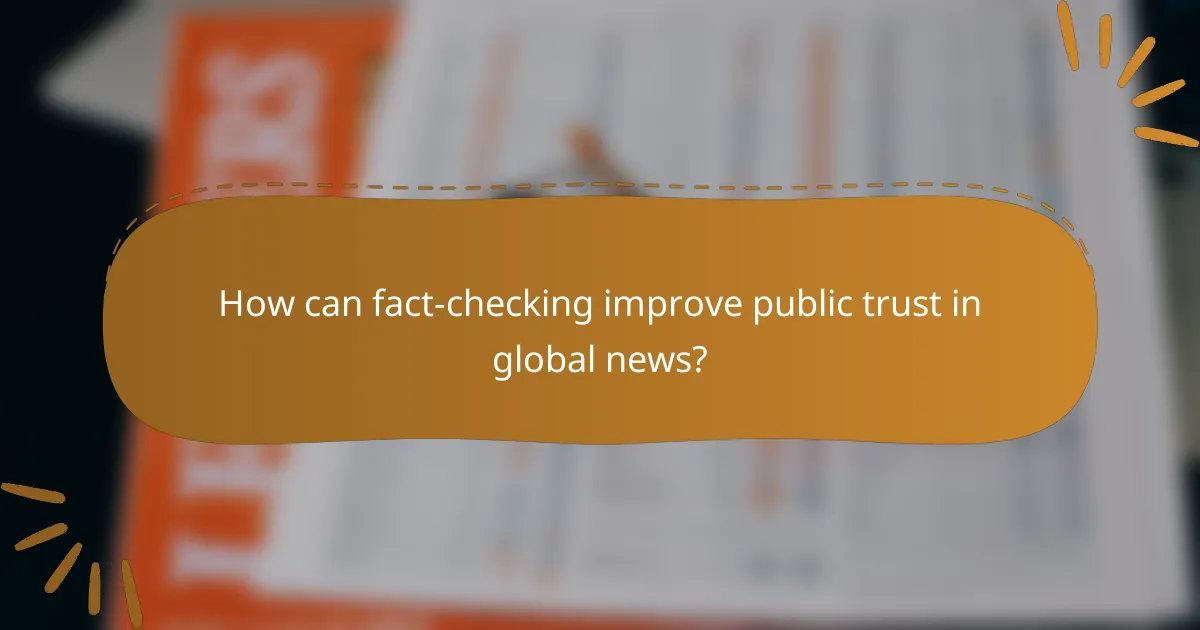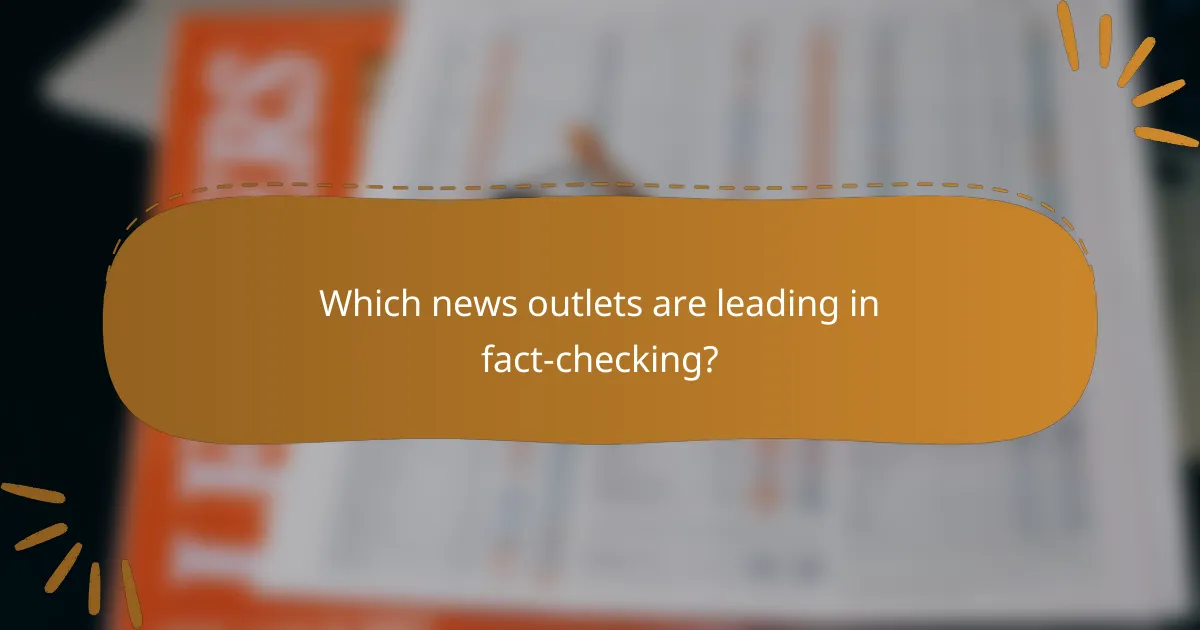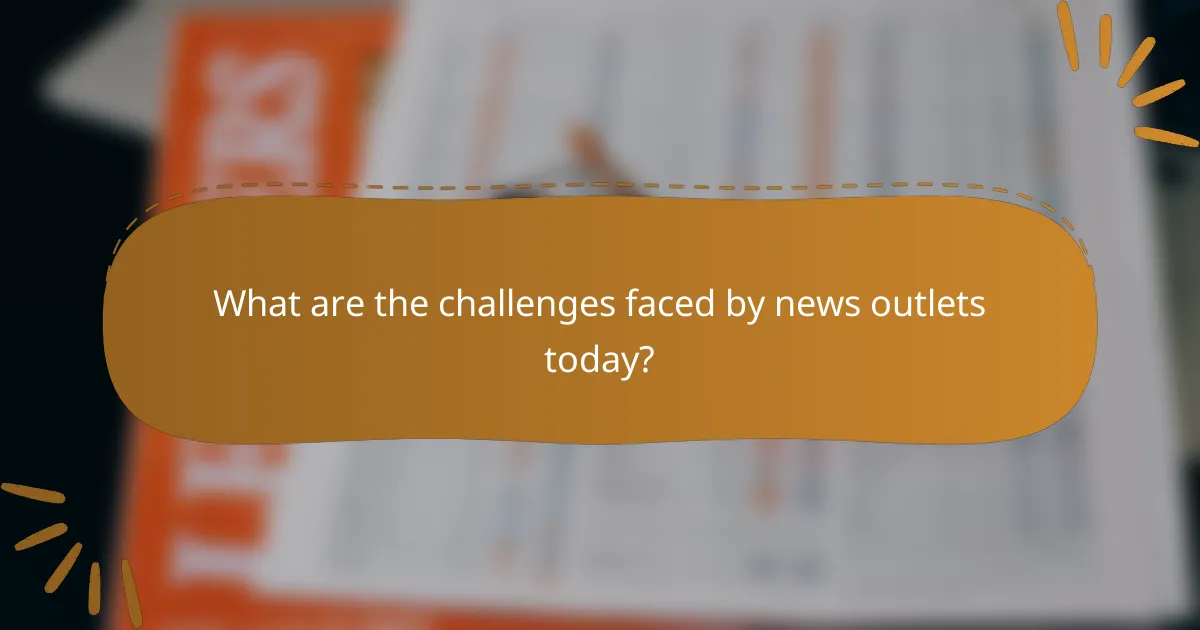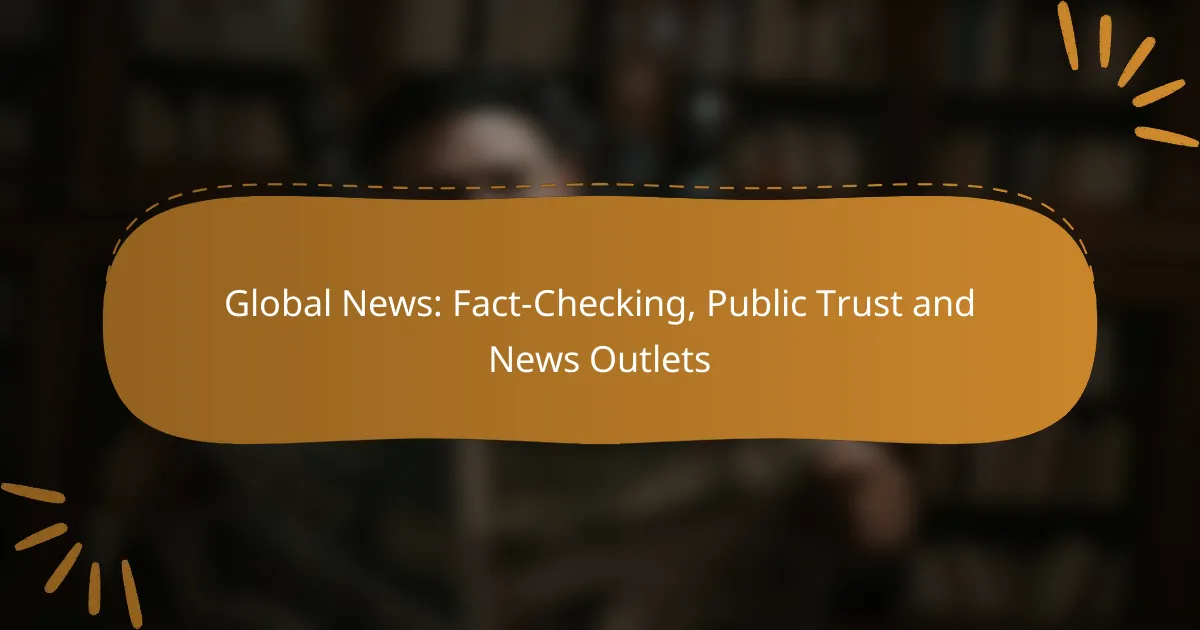In an era where misinformation can spread rapidly, fact-checking plays a vital role in enhancing public trust in global news. By verifying information before publication, news outlets can provide a reliable foundation for their audience, fostering confidence in their reporting. Prominent organizations like PolitiFact and FactCheck.org exemplify the commitment to accuracy that is essential for maintaining journalistic integrity in today’s media landscape.

How can fact-checking improve public trust in global news?
Fact-checking can significantly enhance public trust in global news by ensuring accuracy and accountability. When news outlets verify information before publication, they provide a reliable foundation for the audience, fostering confidence in their reporting.
Increased transparency
Fact-checking promotes increased transparency by openly displaying the verification process behind news stories. This allows audiences to see how information is sourced and validated, making the news more accessible and understandable.
For example, news organizations that publish fact-checking reports alongside their articles demonstrate a commitment to honesty, which can positively influence audience perceptions. Transparency helps bridge the gap between journalists and the public, reinforcing trust.
Reduction of misinformation
By systematically addressing false claims, fact-checking plays a crucial role in reducing misinformation. When news outlets actively debunk inaccuracies, they limit the spread of misleading information that can distort public understanding.
For instance, during major global events, fact-checkers often monitor social media and news reports to identify and correct false narratives quickly. This proactive approach helps ensure that audiences receive accurate information, which is vital for informed decision-making.
Enhanced credibility of news outlets
Fact-checking enhances the credibility of news outlets by establishing them as reliable sources of information. When a news organization consistently engages in fact-checking, it builds a reputation for integrity and accuracy.
As audiences become more discerning, they are likely to favor news sources that prioritize fact-checking. This shift can lead to increased readership and loyalty, as consumers gravitate towards outlets that they trust to deliver factual and unbiased reporting.

Which news outlets are leading in fact-checking?
Several news outlets are recognized for their commitment to fact-checking, helping to enhance public trust in journalism. Notable leaders include PolitiFact, FactCheck.org, and Reuters Fact Check, each employing rigorous methods to verify claims and provide accurate information.
PolitiFact
PolitiFact is a prominent fact-checking organization that evaluates statements made by politicians and public figures. It uses a rating system from “True” to “Pants on Fire” to indicate the accuracy of claims, making it easy for readers to understand the reliability of the information.
PolitiFact also provides context for its ratings, often including links to original sources and detailed explanations. This transparency helps users grasp the nuances of each claim and encourages informed discussions about political issues.
FactCheck.org
FactCheck.org is a project of the Annenberg Public Policy Center that focuses on monitoring the factual accuracy of statements made by political leaders and interest groups. It aims to reduce misinformation by providing thorough analyses and sourcing for its findings.
The site is user-friendly, allowing visitors to search for specific topics or claims. FactCheck.org also publishes articles that explain complex issues, making it a valuable resource for anyone looking to understand the facts behind political rhetoric.
Reuters Fact Check
Reuters Fact Check is part of the global news agency Reuters, which applies its journalistic standards to verify claims circulating in the media and online. This service focuses on debunking misinformation and providing accurate context for trending topics.
Reuters Fact Check often includes visual aids, such as infographics and videos, to enhance understanding. Its international perspective allows it to cover a wide range of issues, making it a reliable source for fact-checking across different countries and cultures.

What role do social media platforms play in news dissemination?
Social media platforms are crucial in how news is shared and consumed, acting as both distributors and amplifiers of information. They enable rapid dissemination of news stories, but also raise concerns about the accuracy and reliability of the information shared.
Amplification of news stories
Social media platforms amplify news stories by allowing users to share content with their networks, which can lead to viral spread. This amplification can significantly increase the reach of news articles, often resulting in millions of views within a short time frame.
For example, a breaking news event can trend on platforms like Twitter or Facebook, drawing attention from traditional media outlets. However, the speed of this dissemination can sometimes prioritize sensationalism over accuracy.
Spread of misinformation
While social media enhances news distribution, it also facilitates the spread of misinformation. False or misleading information can quickly gain traction, often outpacing fact-checked news stories.
Users should be cautious and verify information before sharing. Checking the source, looking for corroborating reports, and being aware of known misinformation campaigns can help mitigate the risks associated with false news.
Fact-checking partnerships
To combat misinformation, many social media platforms have established fact-checking partnerships with independent organizations. These collaborations aim to assess the accuracy of information shared on their sites and provide users with context.
For instance, platforms may label posts that have been flagged as false or misleading, directing users to verified sources for accurate information. Engaging with these fact-checking resources can help users make informed decisions about the news they consume and share.

How do different countries approach news regulation?
Different countries employ various methods for news regulation, balancing freedom of the press with the need for accountability. These approaches can significantly impact public trust and the integrity of news outlets.
United States: self-regulation
In the United States, news regulation primarily relies on self-regulation by media organizations rather than government oversight. The First Amendment protects freedom of speech, allowing news outlets to operate with minimal restrictions.
Media companies often establish internal codes of ethics and standards to guide reporting practices. However, this self-regulation can lead to inconsistencies in quality and accountability, as there are no formal penalties for failing to adhere to these standards.
United Kingdom: Ofcom oversight
The United Kingdom employs a more structured approach to news regulation through Ofcom, the communications regulator. Ofcom oversees broadcasting standards, ensuring that news outlets adhere to guidelines that promote accuracy and impartiality.
While print media is largely self-regulated, broadcasters must comply with strict rules regarding content, including the requirement to provide balanced coverage of news events. This regulatory framework helps maintain public trust in news sources.
Germany: strict media laws
Germany has stringent media laws that govern both print and broadcast news outlets. The country emphasizes the importance of media diversity and the prevention of monopolies, which is crucial for a healthy democratic discourse.
Regulations require news organizations to uphold high standards of accuracy and fairness, with penalties for violations. This regulatory environment fosters a strong sense of responsibility among journalists and helps to maintain public confidence in the media.

What are the challenges faced by news outlets today?
News outlets today confront several significant challenges that impact their operations and credibility. These include declining revenue from advertising, erosion of trust among audiences, and fierce competition from digital platforms.
Declining revenue from advertising
Declining revenue from advertising is a critical challenge for news outlets, as traditional advertising models have shifted dramatically. Many outlets now see advertising revenues drop by significant percentages, often in the range of 20-50%, as advertisers move to digital platforms.
To adapt, news organizations are exploring alternative revenue streams, such as subscription models and sponsored content. However, transitioning to these models requires careful planning and may not fully compensate for lost ad income.
Trust erosion among audiences
Trust erosion among audiences poses a significant hurdle for news outlets, as many consumers question the credibility of information. Factors contributing to this decline include the prevalence of misinformation and perceived biases in reporting.
To rebuild trust, news organizations must prioritize transparency and accountability. This can involve fact-checking claims, disclosing sources, and engaging with audiences through social media to foster open dialogue.
Competition from digital platforms
Competition from digital platforms is reshaping the media landscape, with social media and news aggregators drawing audiences away from traditional news outlets. Many consumers now prefer quick updates from platforms like Facebook or Twitter, often at the expense of in-depth reporting.
To remain relevant, news organizations need to enhance their digital presence and offer unique content that cannot be easily replicated by these platforms. This may include investigative journalism and exclusive interviews that provide added value to readers.

How can news outlets rebuild trust with their audiences?
News outlets can rebuild trust with their audiences by prioritizing transparency and accountability in their reporting. Establishing clear communication about sources, editorial processes, and corrections can help restore confidence among readers.
Implementing transparency measures
Implementing transparency measures involves openly sharing information about how news is gathered and reported. This can include disclosing sources, editorial guidelines, and the processes behind fact-checking. By being upfront about these aspects, outlets can foster a sense of trustworthiness.
For example, news organizations can create dedicated sections on their websites that explain their editorial standards and how they verify information. Regularly publishing corrections and updates can also demonstrate a commitment to accuracy and accountability.
Additionally, engaging with audiences through social media and public forums allows news outlets to address concerns directly and clarify misunderstandings. This two-way communication can significantly enhance public trust over time.
